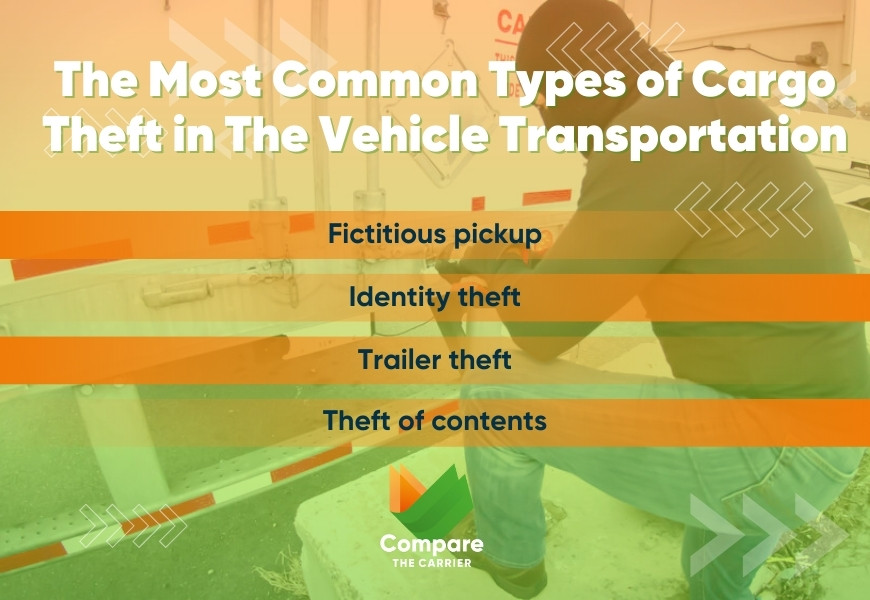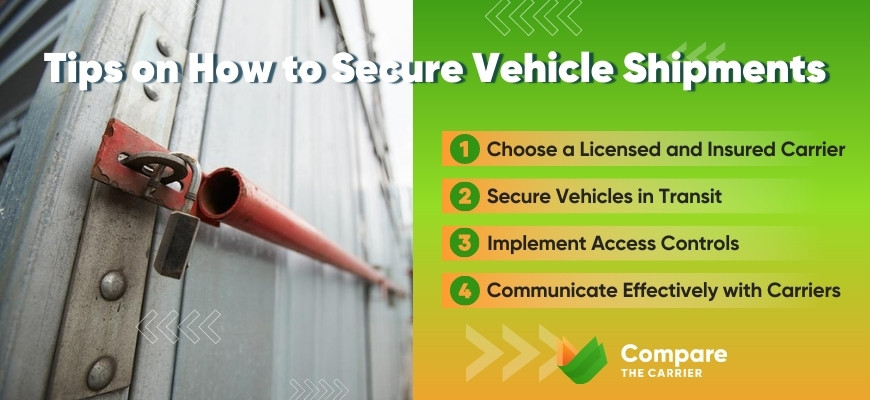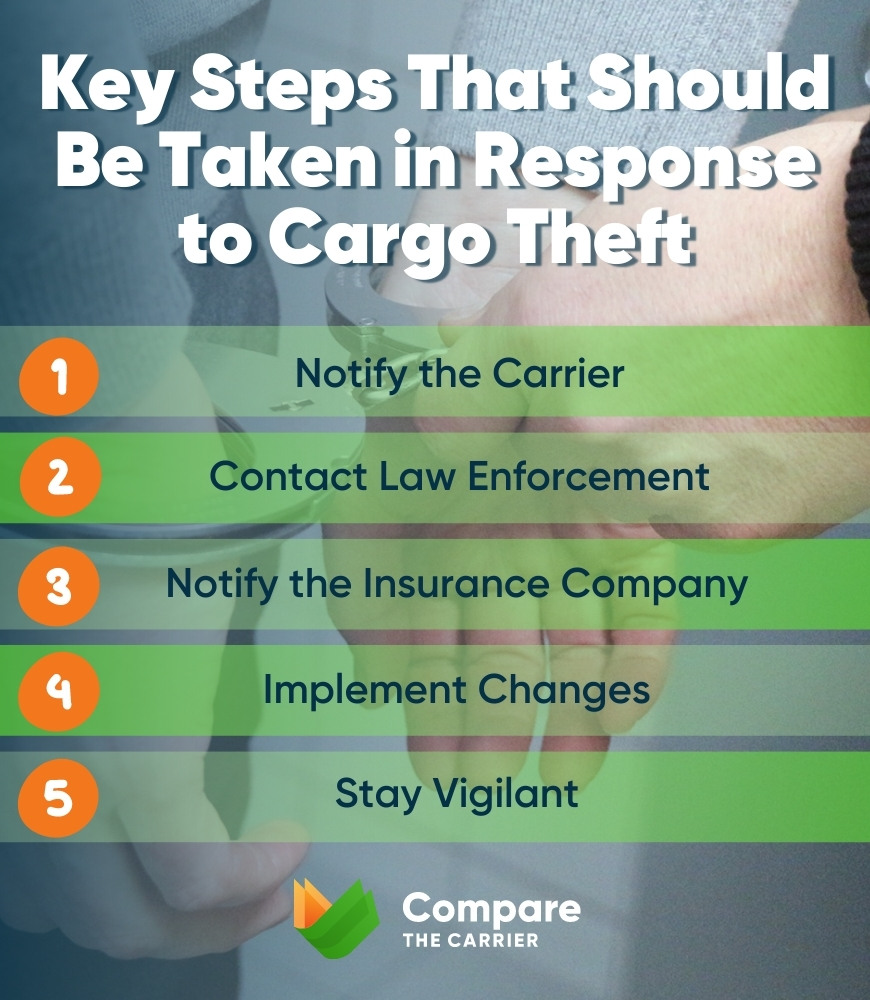Auto transport can be a convenient and cost-effective way to move your vehicle from one location to another. However, it’s important to ensure the security of your shipment against cargo theft, which can cause significant financial losses and delays in delivery. At Compare the Carrier, we understand the importance of protecting your vehicle during transportation, which is why we’ve created this article to help you secure your shipments against theft. In this article, we’ll discuss the types of cargo theft, common targets for vehicle transportation, strategies for securing vehicle shipments, best practices for preventing cargo theft, and how to respond in case of theft.
Cargo Theft and its Impact on Vehicle Transportation
Cargo theft is a major issue in the vehicle transportation industry, with millions of dollars in losses each year. In this section, we’ll discuss the types of cargo theft, common targets for vehicle transportation, and the impact of cargo theft on the auto transport industry.
Types of Cargo Theft
Cargo theft occurs in different forms and may involve various levels of sophistication. The most common types of cargo theft in the vehicle transportation industry include:

Common Targets for Vehicle Transportation
Vehicles are one of the most common targets for cargo theft in the auto transport industry, as they are valuable and relatively easy to steal. High-end luxury cars, sports cars, and classic cars are particularly attractive to thieves. Additionally, vehicles that are in transit and parked at rest stops, truck stops, or other unsecured locations are especially vulnerable to theft.
Cargo theft is a serious threat to the auto transport industry, with the potential to cause significant financial losses, delivery delays, and damage to carriers’ reputations. As we’ll explore in the following sections, there are strategies and best practices that shippers and carriers can implement to help mitigate the risk of cargo theft and ensure the safe and secure transportation of vehicles. By being proactive in their approach to vehicle transportation security, shippers and carriers can help protect themselves against cargo theft and build trust with their customers.
Strategies for Securing Vehicle Shipments
As a shipper, you have a responsibility to ensure the safe and secure transportation of your vehicles. Cargo theft can result in significant financial losses, damage to your reputation, and delays in delivery. Here are some effective strategies for securing your vehicle shipments:

Choose a Licensed and Insured Carrier
Before engaging with a carrier, it is important to conduct a thorough background check to ensure that they have a legitimate business and are licensed and insured. This can help to prevent fictitious pickups and identity theft, which are common forms of cargo theft. Using a reputable and licensed carrier can provide an additional layer of security and peace of mind.
Secure Vehicles in Transit
To help prevent theft, it is important to secure vehicles while they are in transit. This may include using immobilization devices, such as wheel locks or steering wheel locks, to prevent the vehicle from being driven away. Additionally, make sure to work with carriers that use secured parking facilities when vehicles are parked overnight or for extended periods.
Implement Access Controls
As a shipper, you can implement access controls to help prevent unauthorized individuals from accessing the shipment. Require identification and verify authorization before allowing access to the vehicle or cargo. You can also require tamper-evident seals to detect any unauthorized access to the cargo.
Communicate Effectively with Carriers
Communication is critical to effective vehicle transportation security. Make sure to communicate your security requirements with carriers, and ensure that they are complying with your requirements. Consider having regular conversations about security protocols, and provide feedback on how to improve the security of your shipments.
Cargo theft is a serious threat to the transportation industry, and shippers must take proactive steps to secure their vehicle shipments. In order to mitigate the risk of cargo theft, you should take proactive steps to secure your vehicle shipments. Don’t hesitate to discuss security concerns with carriers and work together to implement effective security measures. By working together with carriers and staying vigilant, we can protect against cargo theft and ensure the continued success of the auto transport industry.
Best Practices for Preventing Cargo Theft in Vehicle Transportation
As a shipper, there are several best practices you can follow to help prevent cargo theft and ensure the safe transportation of your vehicles. By implementing these practices, you can help to protect your vehicles and minimize the risk of theft.

By following these best practices, shippers can minimize the risk of cargo theft and ensure the safe and timely delivery of their vehicles. It’s important to work closely with the carrier and communicate effectively to ensure that all security measures are in place. Remember that cargo theft can have significant financial and reputational impacts, so it’s essential to take every precaution to prevent it. By staying vigilant and proactive, shippers can protect their shipments and contribute to the continued success of the auto transport industry.
Response to Cargo Theft in Vehicle Transportation
Cargo theft can occur despite all necessary precautions taken by the shipper and the carrier. In such a situation, it is essential to take immediate action to minimize the impact of the theft and recover the losses. This section outlines the key steps that one should take in response to cargo theft in vehicle transportation.

It is essential to work closely with the carrier, law enforcement, and the insurance company to ensure a swift and effective response. Remember that cargo theft can have significant financial and reputational impacts, so it’s crucial to take every precaution to prevent it and respond effectively if it does occur. Taking these steps can minimize the impact of cargo theft and help in the recovery of stolen goods.
In conclusion, cargo theft poses a significant threat to the transportation industry, resulting in substantial financial losses and reputational damage.In the event of theft, notify carriers, law enforcement, and insurance companies, implement necessary changes, and remain vigilant.
At Compare The Carrier, we work with licensed and professional carriers, emphasizing prevention strategies and best practices for a smooth and secure shipping process. Follow these guidelines to safeguard valuable vehicle shipments and prevent cargo theft.
FAQ
What are some common targets for cargo theft in vehicle transportation?
High-end vehicles, valuable spare parts, and luxury accessories are often targeted by cargo thieves.
What security measures can I take to prevent cargo theft during transportation?
Some security measures include hiring a reputable carrier with a proven track record of security, avoiding high-crime areas, and utilizing secure parking lots and facilities.
What should I do if my cargo is stolen during transportation?
Immediately contact your carrier, law enforcement, and insurance company to report the theft. Make sure to provide all necessary details and documentation, including the bill of lading and delivery receipt.
Can I file a claim if my cargo is stolen during transportation?
Yes, if you have insurance coverage, you can file a claim to recover the value of your stolen cargo.
How can I ensure that my carrier is licensed and professional?
You can check the carrier’s operating authority and safety record through the Federal Motor Carrier Safety Administration’s (FMCSA) website. Additionally, check online reviews and ratings from previous customers.
What steps can carriers take to prevent cargo theft?
Carriers can implement security protocols such as thorough background checks for employees, training programs, and cargo seals to prevent unauthorized access to shipments.
How can effective communication help prevent cargo theft?
By communicating regularly and accurately with carriers, shippers can ensure that all security measures are in place and potential risks are identified and addressed.

















